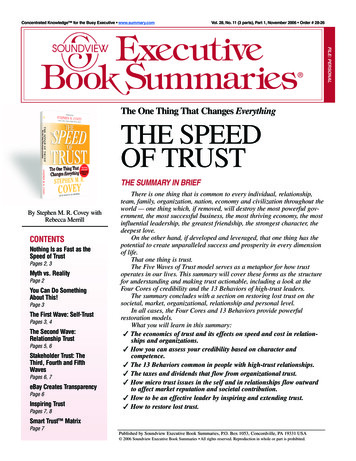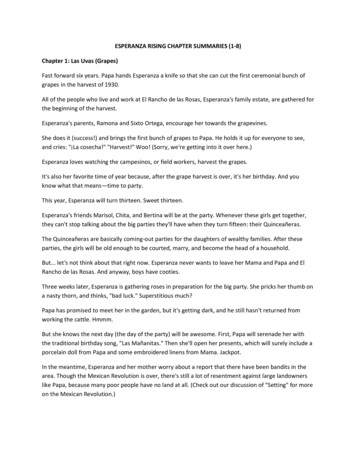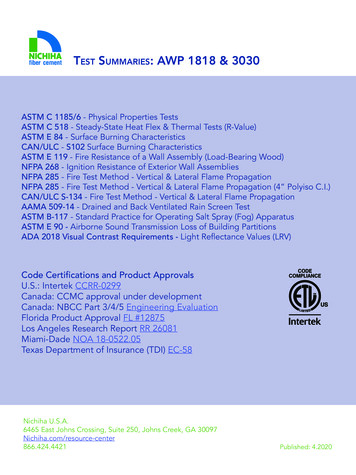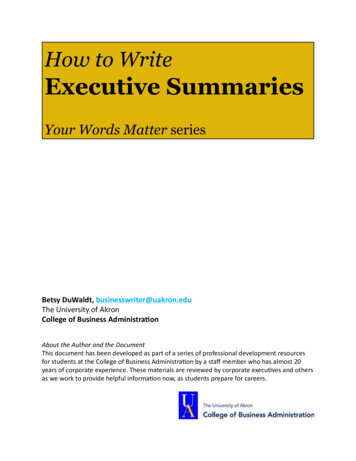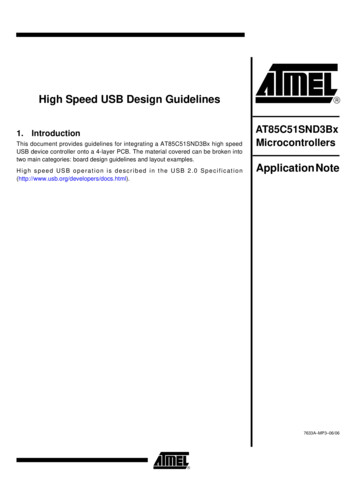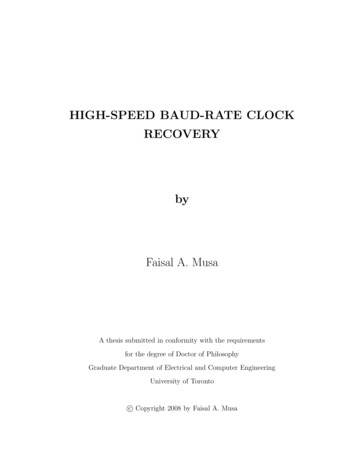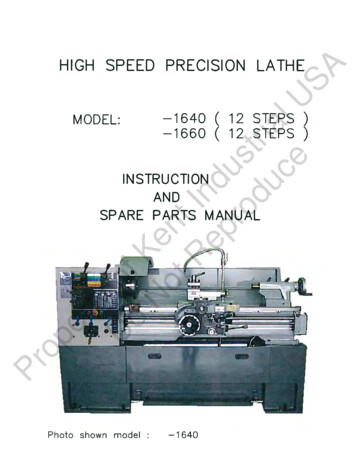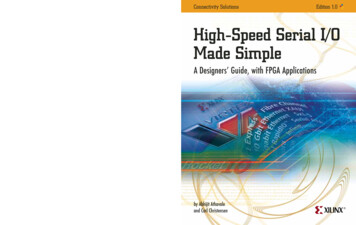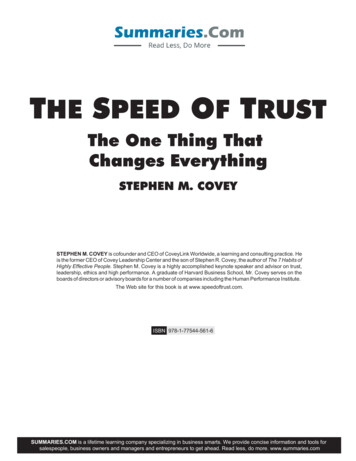
Transcription
THE SPEED OF TRUSTThe One Thing ThatChanges EverythingSTEPHEN M. COVEYSTEPHEN M. COVEY is cofounder and CEO of CoveyLink Worldwide, a learning and consulting practice. Heis the former CEO of Covey Leadership Center and the son of Stephen R. Covey, the author of The 7 Habits ofHighly Effective People. Stephen M. Covey is a highly accomplished keynote speaker and advisor on trust,leadership, ethics and high performance. A graduate of Harvard Business School, Mr. Covey serves on theboards of directors or advisory boards for a number of companies including the Human Performance Institute.The Web site for this book is at www.speedoftrust.com.ISBN 978-1-77544-561-6SUMMARIES.COM is a lifetime learning company specializing in business smarts. We provide concise information and tools forsalespeople, business owners and managers and entrepreneurs to get ahead. Read less, do more. www.summaries.com
The Speed of Trust - Page 1MAIN IDEATrust is not something which is merely “touchy-feely” or “nice-to-have”. Rather, trust is a hard-nosed business asset which can deliverquantifiable economic value. When trust is high, speed of execution goes up and costs go down. For that and other sound reasons, itmakes good financial sense to consistently find ways to enhance trust levels both within and external to your business organization.To build and enhance trust, you need a workable mental model. Visualize trust as being like the “ripple effect” which occurs when adrop falls into a pool of water. That drop will generate a number of concentric waves. Trust is like this because it always flows from theinside out. In the case of increasing trust, there are five waves, each of which represents a context in which trust is established.The Five Waves of Trust1234 51Self trustCredibility2Relationship trustConsistent behavior3Organizational trustAlignment4Market trustReputation5Societal trustContributionKeyUnderlyingPrinciplesTo turn trust from an intangible into an economic driver of value for you personally and for your business organization, work toconsistently build the trust which exists in each of these five waves.“Trust impacts us 24/7, 365 days a year. It undergirds and affects the quality of every relationship, every communication, every workproject, every business venture, every effort in which we are engaged. Contrary to what most people believe, trust is not some soft,illusive quality that you either have or you don’t; rather, trust is a pragmatic, tangible, actionable asset that you can create – muchfaster than you think possible. I am also convinced in every situation nothing is as fast as the speed of trust. And, contrary to popularbelief, trust is something you can do something about. In fact, you can get good at creating it.”– Stephen M. CoveyWave 1 – Self trust . . . . . . . . . . . . . . . . . . . . . . . . . . . . . . . . . . . . . . . . . . . . . . . . . . Pages 2 - 3Self trust is derived from your abilities and your capacity to set and achieve goals and keep commitments.If you walk your talk, then you’ll feel good about your actions. That inner-sense of contentment andconsistency then makes it possible for you to be worthy of the trust of others. Credibility is derived from fourcore sources which you should seek to build: (1) Integrity; (2) Intent; (3) Capabilities and (4) Results.Wave 2 – Relationship trust . . . . . . . . . . . . . . . . . . . . . . . . . . . . . . . . . . . . . . . . . . . . . Pages 4 - 6Relationship trust essentially boils down to a matter of how you establish and subsequently increase thevirtual trust accounts you have with other people. The key here is to act consistently at all times and in allcircumstances. High-trust leaders consistently exhibit 13 behaviors, each of which can be learned andthen applied by everyone in order to generate trust:(1) Talk straight; (2) Show respect; (3) Be transparent; (4) Right wrongs; (5) Show loyalty;(6) Deliver results; (7) Get better; (8) Confront reality; (9) State expectations;(10) Be accountable; (11) Listen first; (12) Meet commitments; (13) Extend trust.Wave 3 – Organizational trust . . . . . . . . . . . . . . . . . . . . . . . . . . . . . . . . . . . . . . . . . . . . . . . Page 6When you work with people you trust, more can get done. Organizational trust is derived from alignment –having the organization’s systems, structures and rewards aligned with one consistent objective. Wheneverything is aligned correctly, trust grows. When these various elements are misaligned, trust is reducedor dissipated.Wave 4 – Market trust . . . . . . . . . . . . . . . . . . . . . . . . . . . . . . . . . . . . . . . . . . . . . . . . . . . Page 7Market trust is easy to understand and measure. It is driven by your reputation. When customers, investorsand others in the marketplace trust your brand, they act differently. They will buy more, refer more and giveyou the benefit of the doubt. They will also stay with you especially when they can see how your brand isevolving and improving over time.Wave 5 – Societal trust . . . . . . . . . . . . . . . . . . . . . . . . . . . . . . . . . . . . . . . . . . . . . . . . . . Page 7Societal trust increases when you create value for others and for society at large. The key here is to make ameaningful contribution. When you give something back to society, suspicion and cynicism can be offsetor allayed. Frequently these actions also inspire others to create value and to contribute as well.Summation – Inspiring Trust in Others. . . . . . . . . . . . . . . . . . . . . . . . . . . . . . . . . . . . . . . . . . Page 8Nothing in business is as fast or as profitable as trust. Accordingly, the first job of any leader is to inspiretrust in others. This single competency and ability will create the foundation upon which all successfulenterprises and personal careers stand. The ability to inspire trust in others is also the prime differentiatorbetween managers and leaders.
The Speed of Trust - Page 2To increase your integrity:The Five Waves of TrustCredibilitySelf trust1Self trust is derived from your abilities and your capacity to setand achieve goals and keep commitments. If you walk your talk,then you’ll feel good about your actions. That inner-sense ofcontentment and consistency then makes it possible for you tobe worthy of the trust of others. Credibility is derived from fourcore sources, each of which you should seek to build:Credibility1Integrity – Do you do what you say?2Intent – Do you have a hidden agenda?3Capabilities – Are you relevant?4Results – What’s your track record?Before it becomes possible to build trust with others, you firsthave to trust yourself. This is an “inside-out” approach. To havecredibility with others in society, you first need to have an internalfoundation you feel good about. Credibility essentially boils downto two questions people everyone needs to be able to answer: Do I trust myself? Am I someone others can trust implicitly?1. Get into the habit of making and then keeping personalcommitments to yourself – which in practical terms meansyou probably should make less commitments, not more.Don’t make commitments impulsively but treat each as animportant undertaking.2. Stand for something bigger than yourself – perhaps bycreating a personal mission statement which articulates whatyou want to be known for. Then show by your actions youwant to stand for the right things.3. Be candid and open – never be afraid of looking at new anddifferent ways to get the right things done. Have the humilityand courage to admit you don’t know everything and learnfrom others. This creates the kind of trust which underpinsyour personal integrity.“I look for three things in hiring people. The first is personalintegrity, the second is intelligence, and the third is a high energylevel. But, if you don’t have the first, the other two will kill you.”– Warren Buffett, CEO, Berkshire Hathaway4 CoresThere are four foundation elements or cores that will make youcredible or believable, both to yourself and others:4 Cores1Integrity – Do you do what you say?Most people equate “honesty” with “integrity”, but it actuallyincludes much more. To have integrity means to act inaccordance with your personal values and belief system at alltimes and in all circumstances. Integrity is like the roots of a treein that it lies under the surface and yet it is absolutely vital to thenourishment and stability of the entire tree.Integrity certainly involves telling the truth but it also includes:nCongruence – acting in ways which harmonize completelywith your personal beliefs and values. People withcongruence are the same inside and out, in private and inpublic.nHumility – being more concerned about what is right thanbeing right, about acting on good ideas rather than defendinga position, about recognizing contribution instead of worryingabout being recognized.nCourage – the intestinal fortitude to do the right thing, evenwhen it’s hard and may have some kind of personal costinvolved in one way or another.Intent – Do you have a hidden agenda?Intent is vital to your credibility. Even if you have integrity,capability and results, if your intent is poor people will questionyour motives seriously. The key components of intent are:nMotives – your reason for doing one thing and not another.The motive which will inspire the greatest amount of trust iswhen you genuinely care about the well being of others.nYour agenda – what you intend to achieve. The agenda whichinspires the greatest amount of trust is generally seeking formutual benefit and win-win outcomes.nBehavior – whether your actions show you don’t care. Thenoteworthy behavior which always inspires trust is acting inthe best interests of others. When you do that, you showdefinitively what your motives and agenda are.1 CredibilityEnhancing and building your personal credibility is somethingyou can do proactively rather than being forced to work with whatcurrently exists. You can choose to enhance credibility throughthe decisions you make and the actions you take. Equally,personal credibility becomes diluted and dissipates when youmake decisions you don’t feel good about at a personal level.2Keeping in mind the fact intent is something you just can’t fake,there are a few things you can do to improve your intent:1. Always pause and examine your motives – and if necessaryrefine and improve them. Most rational people want to actwith good intentions and make good things happen so pauseregularly and check what you’re doing actually aligns withthose good intentions.2. Declare your intent out loud – so others cannot misconstruewhat you’re attempting to do. Vocalize your goal so peopleknow what to look for. Just make certain you’re honest indoing this, because people can spot fakes a mile away.3. Always choose abundance over scarcity – meaning there isenough for everyone so don’t begrudge others their fairshare. If you go out of your way to see that others do well fromtheir dealings with you, your personal credibility will soar.“I think every good company has got to have a partnershiprelationship, really, with their employees. You have got to work intheir best interest and eventually it will come back to thecompany.”– Sam Walton, founder, Wal-Mart and Sam’s Club“The measure of your life will not be in what you accumulate, butin what you give away.”– Dr. Wayne Dyer, author, The Power of Intention
The Speed of Trust - Page 34 Cores3Capabilities – Are you relevant?Your capabilities are your unique personal blend of talents, skills,knowledge, capacities and abilities which enable you to performwith excellence. Capabilities inspire trust and generateself-confidence. To remain credible over the long haul, youshould anticipate your personal capabilities will need to beupgraded and enhanced on a regular basis.A good way to think about the different dimensions of capabilitiesis to use the acronym “T-A-S-K-S”:TTalents – your natural gifts and strengths. This will be thosethings that just come naturally without any great effort or inputon your part.AAttitudes – your ways of getting things done. The paradigmsand mental models you habitually use will influence the wayyou see the world and yourself.SSkills – your proficiencies or the things you do exceptionallywell. Skills can and should be overhauled and upgradedperiodically to remain relevant.KKnowledge – your learning, insights, understanding andawareness levels. Obviously increasing knowledge is vitaland profitable in today’s global knowledge economy.SStyle – the way you approach challenges combined with yourpersonality traits. There is wide variance in the most effectivestyles in business, which is good.The key to increasing your personal credibility is to develop yourT-A-S-K-S and to match them to the tasks at hand. If you cancreate the best possible alignment between what you do andyour natural gifts, passions, skills, knowledge and style, you willhave the credibility you need to excel. This requires ongoing andcontinuous improvement to avoid becoming obsolete andultimately irrelevant.To increase your capabilities:1. Identify your strengths and work hard at leveraging thoseareas – so you end up feeding your opportunities forexcellence and starving your potential for mediocrity. It’salways better to build on your strengths rather than spendingtime and effort attempting to compensate for yourweaknesses.2. Keep yourself relevant – by engaging in lifetime learning.Think of your formal education as a crash course in how tokeep learning for the rest of your life and then put that ethicinto action. The more you know, the greater your careeroptions and opportunities will be.3. Know exactly where you’re going – so others will fellconfident about following you. Credible leaders inspireothers by demonstrating their competence coupled withcharacter. People always want to be inspired rather thancompelled. Find ways to make this happen.“The complacent company is a dead company. Success todayrequires th
–Stephen M. Covey Results matter. They give you clout and classify you as a duntilyouhave a solid track record of reaching your milestones and tangible goals, you willhave little or no credibility and almost certainly no meaningful trust. The two critical questions to ask yourself are:

